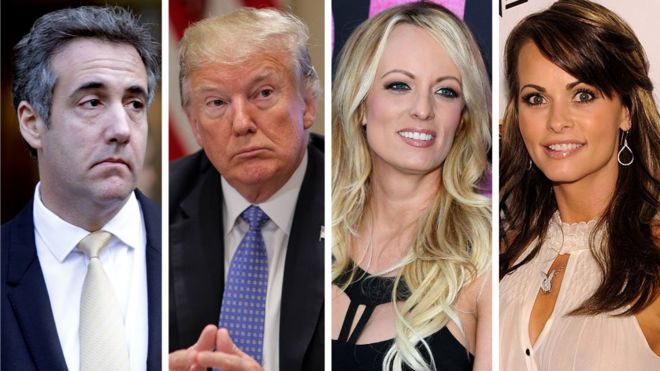
Trump: Hush payments came from me but were not a campaign violation
US President Donald Trump has denied using election campaign finances to make payments to two women who say he had affairs with them.
It comes after his ex-lawyer, Michael Cohen, pleaded guilty to violating laws during the 2016 presidential election over his handling of the hush money.
In a TV interview with Fox & Friends, Mr Trump said the payments came from him personally, not from the campaign.
Earlier he accused Cohen of making up stories to receive a lighter sentence.
In an excerpt from the Fox & Friends interview, which will be aired in full on Thursday, Mr Trump responded to questions about the hush payments by insisting that they were "not a campaign violation".
"They came from me. And I tweeted about it. But they did not come out of the campaign," he says, adding that he only found out about the payments "later on".
His comments contradict a statement made earlier by Cohen under oath in which he said the president had instructed him to make the payments.
In July, Cohen released audio tapes of him and Mr Trump allegedly discussing one of the payments before the election.
Has Trump contradicted himself?
In his first public comments, back in April, about an alleged affair with porn star Stormy Daniels, Mr Trump denied knowing about a $130,000 (£100,000) payment made to the actress via his lawyer, Cohen.
Ms Daniels, whose real name is Stephanie Clifford, alleges that she and Mr Trump had sex in a hotel room in 2006.
Asked by a reporter in the press cabin of Air Force One if he had any knowledge about where Cohen got the money to pay Ms Daniels, the president responded at the time: "I don't know."
The following month, Mr Trump officially disclosed a payment to Cohen of between $100,001 and $250,000 for expenses incurred in 2016.
Why did Cohen pay hush money?
Undisclosed payments to bury embarrassing stories about a political candidate can be treated as a violation of US campaign finance laws.
Both prosecutors and Cohen agree that Cohen violated campaign finance laws by handling the payments.
Cohen, who was Mr Trump's personal lawyer for more than a decade, has admitted to passing on funds to two women - thought to be Ms Daniels and former Playboy model Karen McDougal.
On Tuesday, he pleaded guilty to eight criminal charges, including tax evasion, bank fraud and campaign finance violations.
He said he had paid hush money to two women who alleged they had affairs with Mr Trump, at the direction of "the candidate" - a clear reference to Mr Trump.
Cohen said the payment was made for the "principal purpose of influencing [the 2016] election".
Cohen's lawyer Lanny Davis has asked why the US president should not be prosecuted for the crimes Cohen had confessed to committing on his behalf.
What happens next?
Cohen has reached a plea deal with prosecutors, which may see his prison sentence reduced from 65 years to five years and three months.
On the same day that Cohen pleaded guilty, a jury convicted former Trump campaign chairman Paul Manafort of bank and tax fraud charges.
It was the first criminal trial arising from the justice department probe led by former FBI chief Robert Mueller.
Mr Mueller has been investigating allegations of Russian interference in the 2016 US presidential election, and whether the Trump campaign conspired with Russia to swing the election in his favour.
Russia has denied claims it interfered in the elections.
There is no confirmation that Cohen will speak to Mr Mueller's Russia inquiry.
However, Mr Davis says his client is happy to discuss what he knows about whether Mr Trump was aware in advance of the reported computer hacking which undermined his opponent, Hillary Clinton.
In summer 2016, embarrassing emails hacked from the Democratic National Committee (DNC) server were made public.
Russian intelligence officers have since been charged in absentia for the hack.
Cohen also has knowledge, Mr Davis said, of a meeting at Trump Tower in New York in June 2016 between Trump campaign aides and a Russian delegation which was promising political "dirt".
Mr Trump's son, Donald Trump Jr, went into the meeting in the belief that he would be offered "official documents and information that would incriminate" Mrs Clinton.
Under US campaign law, it is illegal for a US citizen to solicit foreigners for campaign donations or contributions - although legal experts are divided on whether the offer of information counts as such.
President Trump has denied knowing in advance about the meeting.
However, according to US media, Cohen has said that Mr Trump had known about the meeting beforehand and that he is willing to state this to the Russian inquiry.
Credit: BBC
